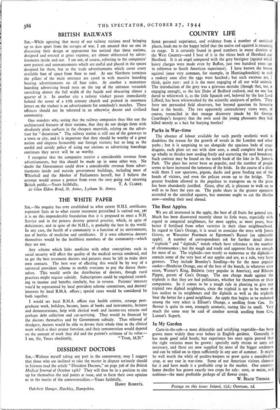THE WHITE PAPER
SIR,—No enquiry has ever established to what extent N.H.I. certificates represent facts or to what extent treatment prescribed is carried out, yet it is on this imponderable foundation that it is proposed to erect a N.H. Service and in the process destroy general practice, which, in spite of deficiencies, and in spite of the N.H.I., is probably the best in the world. In any case, the health of a community is a function of its environment, not of bottles of medicine and certificates. If it were otherwise doctors themselves would be the healthiest members of the community—which they are not.
Any scheme which links medicine with other conceptions such as social security will affect the quality of the medical service rendered, and to get the best treatment doctors and patients must be left to make their own contacts. The best way of effecting this would be by way of a universal provident scheme to enable everyone to pay the doctor them- selves. This would settle the distribution of doctors, though rural practices might require subsidy. Subscriptions could be regulated accord- ing to income and benefits similarly, but in reverse. Patients' interests wou'd be represented by local provident scheme committees, and doctors' interests by local B.M.A. offices ; special cases would be considered by both together.
I would see local B.M.A. offices run health centres, arrange post- graduate work, holidays, locums, loans of books and instruments, lectures and demonstrations, help with clerical work and income-tax returns and perhaps debt collection and car-servicing. They would be financed by the doctors themselves and by Government subsidy. Thus relieved of drudgery, doctors would be able to devote their whole time to the clinical work which is their proper function, and their remuneration would depend on the amount of work they did and the patient's estimate of its value.—


























 Previous page
Previous page